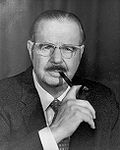| |||||||||||||||||
 County results Scott: 50–60% 60–70% 80–90% Blatt: 50–60% | |||||||||||||||||
| |||||||||||||||||
The 1964 United States Senate election in Pennsylvania was held on November 3, 1964. Incumbent Republican U.S. Senator Hugh Scott successfully sought re-election to another term, defeating Democratic nominee Genevieve Blatt.
Contents
As of 2023, this is the last Senate election where York County voted Democratic.


